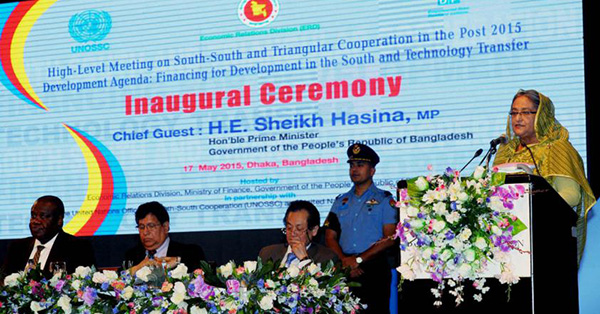Published in The Daily Star on Monday, 18 May 2015.
Connectivity key to higher growth
Analysts say at a global meeting on post-2015 development agenda
Star Business Report
Developing countries should stop running after low-hanging fruits but rather develop connectivity among them to promote sustainable development, analysts said yesterday.
“South-South cooperation is possible, and it can be built through multimodal connectivity such as physical connectivity and ICT,” said Sultan Hafeez Rahman, executive director of the Institute of Governance Studies at Brac University.
“If we can do that, it will ultimately spur economic growth in developing countries and lift billions of people out of poverty,” he said.
For example, if all South Asian countries have road connectivity, it would add 1.5 percent to the region’s gross domestic product, said the former senior official of the Asian Development Bank.
Foreign Secretary Shahidul Haque said connectivity alone can raise GDP growth by 5 percent in Thailand, Vietnam and Myanmar and 2.5 percent in India.
“They will achieve this output growth without doing anything additional,” he said.
They spoke at a session on regional connectivity for sustainable development at the “High Level Meeting on South-South Asia and Triangular Cooperation in the Post-2015 Development Agenda” at Sonargaon hotel in Dhaka.
The two-day meeting is being organised by the Economic Relations Division of the government in partnership with the United Nations Office for South-South Cooperation and United Nations Development Programme.
South-South Cooperation is the mutual sharing and exchange of development solutions — knowledge, experiences and good practices, policies, technology and resources — between and among countries in the global South.
Triangular Cooperation involves partnerships between two or more developing countries along with a third partner, typically a traditional resource partner and/or multilateral organisation.
Inyang Ebong-Harstrup, deputy director of the United Nations Office for South-South Cooperation, said it is easy to promote people-to-people connectivity.
Towfiqul Islam Khan, research fellow of the Centre for Policy Dialogue, said the European Union has proved that regional connectivity is possible despite century-old problems between many countries and cultural and language barriers.
“We can do the same within South Asia, and between South Asia and Asean,” he said, calling for promoting all modes of connectivity in the region.
He said, if South Asia can be connected with Asean (Association of Southeast Asian Nations), the entire Asian region would be integrated.
Khan said regional connectivity has become important as focus is increasingly shifting towards economic issues.
“Tariff level is coming down faster compared to a decade ago. Trade facilitation is also coming up.”
Sultan Hafeez Rahman said nothing would happen if there is no strong political commitment from governments. Countries also cannot bypass local communities, apart from political sensitivity, when they construct any infrastructure.
Rahman said there has been rapid change in the areas of ICT, communications and people-to-people connectivity in recent times.
Trade expert Mostafa Abid Khan said South-South trade costs much higher than that of South-North trade and North-North trade.
“The same is true for South Asian countries. So, it is better for South Asian countries to do more trade with countries outside South Asia,” he said.
Khan said countries in South Asia should not only focus on market access and tariff and non-tariff barriers but also press more for trade facilitation to reduce trade cost.
Qu Guangzhou, deputy chief of mission of the Chinese embassy in Dhaka, gave example of how his country has put more emphasis on building roads as part of a plan to reduce poverty.
He termed the planned Bangladesh-China-India-Myanmar economic corridor as a good start to foster regional connectivity.
The diplomat also said, apart from financial support from the World Bank and the Asian Development Bank, huge funds are available following setting up of the Asian Infrastructure Investment Bank and the Silk Road plan, both led by China.
“China has also set aside $20 billion for developing connectivity and other infrastructure in South Asia. So, China stands ready to support the region,” he said.
In another session, speakers called for enhancing South-South cooperation in science, technology and innovation between least development countries and emerging economies.
Ryan S Song, policy adviser to the president’s office of South Korea, who moderated the session, said countries must learn from the Millennium Development Goals to use science and technology for achieving higher growth.
“If we can build adequate infrastructure, it will bring foreign investment, create jobs, help growth of the local industries and create wealth.”
Yeafesh Osman, state minister for science and technology, said people’s participation is key to driving growth through IT.
Jong-Jin Kim, director of South-South and Resource Mobilisation Division of the Food and Agriculture Organisation, said: “If we can invest in agriculture, we will be able to eliminate hunger and poverty effectively and lead countries to sustainable development.”
Jean-Francis Regis Zinson, permanent representative of Benin to the United Nations, said none has to be left behind in the Post-2015 period. “We have to focus on technology and innovation in raising the skills of youth population.”
Prof Naiyyum Choudhury, chairman of Bangladesh Atomic Energy Regulatory Authority, said: “Technology is global, but your needs are local. So you have to be careful about what technology you will adopt and what not.”


